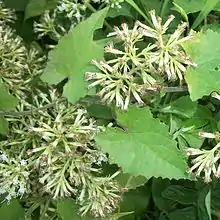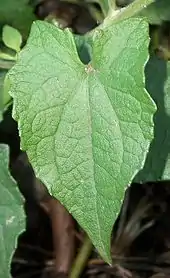Mikania natalensis
Mikania natalensis, the Natal Mikania, is a plant in the family Asteraceae, and is native to Africa.
| Mikania natalensis | |
|---|---|
 | |
| Scientific classification | |
| Kingdom: | |
| (unranked): | |
| (unranked): | |
| (unranked): | |
| Order: | |
| Family: | |
| Tribe: | |
| Genus: | |
| Species: | M. natalensis |
| Binomial name | |
| Mikania natalensis | |
Distribution and habitat
It is found on forest margins from the Eastern Cape of South Africa to Tropical Africa.[1]
Description

Mikania natalensis is a herbaceous,[2] vigorous perennial climber.[1][3] The leaves are opposite and well spaced.[3] The leaf stalk is up to 30 mm long.[3] The leaf blade is about 80 mm by 40 mm,[1] triangular, long-pointed, with pointed backward extensions.[3] The leaf margin is widely (and irregularly[3]) toothed.[1] There are five veins[2] in the leaf from the base.[1] The leaves are velvety grey beneath,[1] and thinly pubescent above.[2] Flowers are 10 mm long,[3] cream-coloured with purplish anthers[1] and white corollas;[3] in loosely branched inflorescences.[1][3] The flowers are heavily scented and produced from April through September.[1]
Mikania natalensis is superficially similar in appearance to Chromolaena odorata, which is an alien invader species in the natural habitat of Mikania natalensis. The butterfly Actinote thalia was considered for the biological control of Chromolaena odorata in southern Africa, but permission to release this control agent was not sought because the larvae were found to consume the leaves of Mikania natalensis.[4]
Human uses
Mikania natalensis is used in traditional Zulu and Swazi medicine for urinary complaints, headaches, backache and colds.[1][5]
Ecology
The flowers are visited by butterflies, bees, wasps and flies.[1]
References
- E. Pooley (1998). A Field Guide to Wild Flowers of KwaZulu-Natal and the Eastern Region. Natal Flora Publications Trust. ISBN 978-0-620-21500-8.
- "Mikania natalensis DC. [family COMPOSITAE]". JSTOR Plant Science. Retrieved 11 September 2011.
- "Mikania natalensis DC". Swaziland's Flora Database. Retrieved 11 September 2011.
- Neuenschwander, P. et al. Biological control in IPM systems in Africa. CABI Publishing.
- Chris Long (December 2005). "siSwati Names and Uses". Swaziland's Flora. Retrieved 11 September 2011.